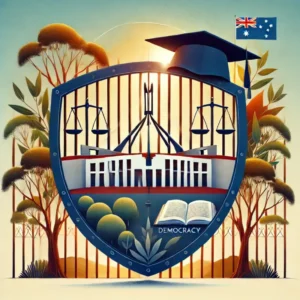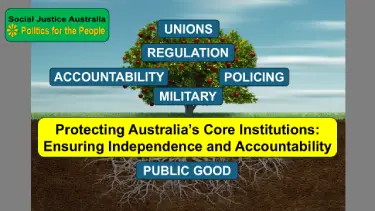Description
Protecting core institutions by strengthen unions, regulatory bodies, policing, and military for public good and prevent abuse of power.
Introduction
Protecting core institutions such as Australia’s labour unions, regulatory bodies, policing services, and military are foundational institutions that support societal stability and safeguard the public good.
However, in recent decades, external pressures—particularly from the USA and corporate interests—have threatened their independence and efficacy. Additionally, internal power abuses within these institutions undermine their credibility and public trust.
In this comprehensive guide, we explore how these institutions can be protected from external influence, power abuse, and internal corruption to ensure they continue to serve their intended purpose: promoting the welfare of Australians.
The Threats to Australia’s Core Institutions
Labour Unions: External Pressure and Internal Power Struggles
 Labour unions in Australia have a long history of advocating for workers’ rights, but they face significant challenges today. External pressure from multinational corporations and a neoliberal economic framework driven by US policies has weakened union power, while some unions have become bureaucratic, prioritizing internal politics over members’ needs.
Labour unions in Australia have a long history of advocating for workers’ rights, but they face significant challenges today. External pressure from multinational corporations and a neoliberal economic framework driven by US policies has weakened union power, while some unions have become bureaucratic, prioritizing internal politics over members’ needs.
Additionally, the relationship between unions and politics adds another layer of complexity. Many Australian politicians, particularly from the Australian Labor Party, come from union backgrounds, using their union roles as stepping stones into political careers.
While this has allowed workers’ voices to be represented in Parliament, it has also created potential conflicts of interest. Union leaders may prioritize political connections or their own ambitions over the welfare of their members, potentially weakening the union’s ability to advocate effectively for workers.
Examples of Conflict:
Several high-profile politicians, such as former Prime Ministers Bob Hawke and Julia Gillard, transitioned from union leadership into politics. While they championed workers’ rights, critics argue that this trend has led to a blurred line between union advocacy and political ambition.
For some union leaders, the allure of political power might take precedence over their duty to represent workers effectively. In extreme cases, unions could be more focused on political manoeuvring than addressing workers’ immediate needs, creating a misalignment between leadership goals and membership expectations.
Regulatory Bodies: Captured by Corporate Interests
Industry regulatory bodies are designed to ensure industries such as finance, energy, and telecommunications operate fairly and transparently. However, corporate lobbying has compromised the integrity of these regulators, often making them toothless.
One example is the Australian Securities and Investments Commission (ASIC), which has been criticized for its slow response to misconduct in the financial services sector.
Statistics and Stories:
A 2020 report by the Hayne Royal Commission exposed systemic misconduct in Australia’s banking sector, including major failings in regulatory oversight. Despite being tasked with protecting consumers, regulators were often too slow to act, leading to devastating consequences for ordinary Australians.
Policing Services: Caught Between Public Duty and Political Influence
Australia’s policing services are responsible for keeping public safety and upholding justice. However, the increased militarization of the police force, influenced by international security agreements like Five Eyes, has caused concerns. Additionally, there have been numerous incidents where police forces have been accused of abusing power, disproportionately targeting vulnerable communities.
Statistics and Stories:
Between 2016 and 2020, there were more than 400 complaints of excessive force used by the New South Wales Police. These incidents have raised concerns about the culture within Australian police forces and the need for better oversight and accountability.
Military: Risk of Losing Sovereignty to US Influence
Australia’s military plays a crucial role in defending national security, but its close ties to US military interests, especially through partnerships like AUKUS, risk compromising Australia’s sovereignty. As Australia becomes more integrated into US defence strategies, there is growing concern that the military is prioritizing foreign interests over national needs.
Statistics and Stories:
 Australia’s recent commitment to AUKUS, which includes buying nuclear-powered submarines from the US, sparked debates over the country’s sovereignty. Many experts warn that this deal will entrench Australia in future conflicts driven by US geopolitical interests rather than protecting the region.
Australia’s recent commitment to AUKUS, which includes buying nuclear-powered submarines from the US, sparked debates over the country’s sovereignty. Many experts warn that this deal will entrench Australia in future conflicts driven by US geopolitical interests rather than protecting the region.
The Consequences of Failing to Act
The consequences of not addressing external influences, conflicts of interest, and power abuse in these institutions are significant. Weakening labour unions means Australian workers will continue to lose protections, face stagnant wages, and endure precarious employment.
Ineffective regulatory bodies will not protect consumers, leading to unchecked corporate abuses. Militarized policing and external influence on Australia’s defence policies will erode public trust and diminish Australia’s independence.
Additionally, union leaders using their positions as stepping stones into politics may prioritize their own political ambitions over the welfare of their members. This creates a dangerous cycle where the interests of the workers are sidelined in favour of the personal or political gains of union leaders.
Real-Life Impact on Australians:
1. Workers without union protection are vulnerable to exploitation, unfair dismissal, and dangerous working conditions.
2. Regulatory failures can result in financial crises, environmental degradation, and unsafe products entering the market.
3. Over-policing of marginalized communities creates divisions increases crime rates and leads to long-term social issues.
4. Military dependence on foreign powers compromises Australia’s ability to make independent decisions, entangling the country in conflicts that do not serve national interests.
5. Union leaders prioritizing political careers may dilute the representation and advocacy for workers, leaving them more vulnerable in negotiations or legal battles.
Protecting Core Institutions
 To ensure that Australia’s core institutions stay robust and serve the public interest, several critical reforms must be enacted. These reforms focus on keeping independence from external influence, preventing internal corruption, ensuring accountability, and addressing conflicts of interest, especially within unions.
To ensure that Australia’s core institutions stay robust and serve the public interest, several critical reforms must be enacted. These reforms focus on keeping independence from external influence, preventing internal corruption, ensuring accountability, and addressing conflicts of interest, especially within unions.
Strengthening Labour Unions and Ensuring Accountability
Key Solutions:
1. Restore Collective Bargaining Rights:
Reinstate robust collective bargaining rights to ensure unions can effectively negotiate fair wages and conditions for workers.
2. Democratize Union Governance:
Introduce mandatory transparency measures and democratic elections within unions to prevent internal power struggles and corruption. All union members should have a say in how their union runs.
3. Separation of Union and Political Roles:
Enforce stricter regulations preventing union leaders from holding simultaneous union and political positions. This will help avoid conflicts of interest and ensure that union leadership is still focused on workers’ rights, not political advancement.
4. Legislative Support for Unions:
Implement laws that protect unions from corporate retaliation, ensuring they can advocate for workers without fear of legal repercussions.
Success Story:
The Australian Council of Trade Unions (ACTU) successfully advocated for the Fair Work Act, which restored some worker protections that had been weakened by earlier industrial relations reforms. This shows the power unions can still wield when properly supported by legislation.
Protecting Regulatory Bodies from Corporate Capture
Key Solutions:
1. Independent Funding for Regulatory Bodies:
Ensure that regulatory bodies such as ASIC, the Australian Competition and Consumer Commission (ACCC), and others have independent sources of funding, protecting them from corporate lobbying and government influence.
2. Increased Transparency and Accountability:
Mandate that regulatory bodies publicly show all interactions with industry representatives. This will reduce the risk of regulatory capture and restore public trust.
3. Stronger Enforcement Mechanisms:
Equip regulators with stronger legal powers to investigate and penalize corporations that violate the law. This should include higher fines and criminal charges for corporate misconduct.
Success Story:
The ACCC’s successful lawsuit against Volkswagen over the Dieselgate scandal shows how strong regulatory action can hold corporations accountable when adequate resources and independence are granted.
Ensuring Policing Serves Public Safety, Not Politics
Key Solutions:
1. Set up Independent Oversight:
Create independent oversight bodies to investigate allegations of police misconduct and ensure police forces are held accountable for their actions.
2. De-militarize Policing:
Reduce the influence of international military cooperation (such as with the US) in domestic policing policies. Ensure that the police force is trained to handle civil issues with minimal use of force.
3. Community-Based Policing Models:
Implement community-based policing models that prioritize local engagement and restorative justice practices to reduce crime and build trust with communities.
Success Story:
Victoria Police introduced body-worn cameras to increase transparency and accountability, leading to a reduction in complaints against officers. This simple technology can help prevent power abuse and restore public trust.
Ensuring an Independent and Accountable Military
Key Solutions:
1. Reevaluate Foreign Military Agreements:
Australia should reassess its defence partnerships, particularly with the USA, ensuring that any agreements prioritize national interests over foreign political objectives.
2. Strengthen Civilian Oversight:
Increase civilian oversight of the military to ensure that the Australian Défense Force (ADF) stays accountable to the public and government, not foreign powers.
3. Invest in Domestic Defence Capabilities:
Australia should prioritize building its own defence capabilities, reducing reliance on foreign military equipment and personnel.
Success Story:
Sweden’s focus on domestic defence manufacturing allows it to keep neutrality and independence, ensuring that its military stays accountable to its people and government rather than foreign powers.
Reclaiming Australia’s Core Institutions
To keep a strong, independent, and accountable society, Australia must protect its labour unions, regulatory bodies, policing services, and military from both external influence and internal power abuse.
Labour unions must be empowered to advocate for workers, regulatory bodies must remain independent to enforce accountability, policing must serve the public and not political interests, and the military must defend Australia’s sovereignty without succumbing to foreign control.
Addressing conflicts of interest within unions is critical to ensuring that their leadership stays focused on workers’ rights and does not pursue personal political ambitions at the cost of their members. By enacting these reforms, Australia can ensure these institutions work for the public good and continue to safeguard the nation.
Question for Readers
What steps can you, as an Australian citizen, take to support reforms protection core institutions for future generations?
Call to Action
If you found this article insightful, explore more about political reform and Australia’s monetary sovereignty on Social Justice Australia: https://socialjusticeaustralia.com/.
Share this article with your community to help drive the conversation toward a more just and equal society.
Give feedback in our Reader Feedback section. Let us know how our content has inspired you. Submit your testimonial and help shape the conversation today!

